- Home
- Jim Thompson
The Grifters Page 5
The Grifters Read online
Page 5
“Also,” she concluded, blushing, “also, the young men try to do certain things. They—often, I am greatly embarrassed.”
Lilly nodded gently, feeling a strange tenderness toward the girl. Here was something, someone, absolutely real and the reality was all to the good. Perhaps, under different circumstances, she might have turned out as wholesome and honest—and real—as Carol was. But—she shook herself mentally—to hell with that noise.
She was what she was, and thus Roy had become what he was. And there was nothing to be done about her, assuming that she wanted anything done, but perhaps it wasn’t too late to…
“You’re probably wondering why I was so nosy. Inquisitive, I mean,” Lilly said. “Well, it’s like this. I don’t want to jinx my son by saying that he’s going to be all right, but—”
“Oh, I’m sure he will be, Mrs. Dillon! I—”
“Don’t say it,” Lilly said sharply, knocking on the wooden top of the table. “It might bring bad luck. Let’s just say that when and if he is able to leave the hospital, I’d like you to go on looking after him for a while. At my apartment, I mean. Do you think you’d like that?”
Carol nodded eagerly, her eyes shining. She’d already had more than two weeks of steady employment with Mrs. Dillon, more than she’d ever had before. What a wonderful thing it would be to go on working for her and her nice son, indefinitely.
“Well, that’s fine, then,” Lilly said. “It’s all settled. Now, I’ve got to run along, but—Yes?”
“I was just wondering…” Carol hesitated. “I was wondering if—if Mr. Dillon would want me. He is always very kind, but…” She hesitated again, not knowing how to say what she meant without sounding impolite. Lilly said it for her.
“You mean Roy resents me. He’s against anything I do simply because I do it.”
“Oh, no. I did not mean that. Not exactly, anyway. I was just…”
“Well, it’s close enough,” Lilly smiled, trying to make her voice light. “But don’t worry about it, dear. You’re working for me not him. Anything I do for him is for his own good, so it doesn’t matter if he’s a little resentful at first.”
Carol nodded, a trifle dubiously. Lilly arose from her chair, and began drawing on her gloves.
“We’ll just keep this to ourselves for the time being,” she said. “It’s just possible that Roy will suggest it himself.”
“Whatever you say,” Carol murmured.
They walked to the door of the cafeteria together. Then Lilly headed toward the lobby entrance, and Carol hurried away toward her patient’s room.
The other nurse left as soon as they had checked the chart together. Roy gave Carol a weakly lazy grin, and told her she looked very bad.
“You belong in bed, Miss Roberg,” he said. “I’ll give you part of mine.”
“I do not!” Carol blushed furiously. “You will not!”
“Oh, but you do. I’ve seen girls with that look before. Bed is the only thing that will cure ’em.”
Carol giggled unwillingly, feeling very wicked. Roy told her severely that she mustn’t laugh about such things. “You’d better behave or I won’t kiss you goodnight. Then, you’ll be sorry!”
“I will not!” Carol blushed and wriggled and giggled. “Now, you stop it!”
Roy stopped the teasing after a minute or two. She was honestly embarrassed by it, he guessed, and he wasn’t up to much fun-making himself.
Suspended from a metal stand on the left side of his bed was a jar of syrupy-looking blood. A tube extended from the upended top of it to a quill-like needle in his arm. On the right side of the bed, a similar device dripped saline water into the artery of his other arm. The blood and water had been fed into him thus since his arrival in the hospital. Lying constantly on his back with his arms held flat, he ached almost incessantly, his only relief coming when his body and arms became numb. Sometimes he found himself wondering if life was worth such a price. But the wondering was humorous, strictly on the wry side.
He’d had a long look at death, and he hadn’t liked the look of it at all.
He was very, very glad to be alive.
Now that he was apparently out of danger, however, he did regret one thing—that it was Lilly who had saved his life. The one person to whom he wished to owe nothing, he now owed everything, a debt he could never repay.
He could fret and argue the matter in his mind. He could cite his own incredibly tough constitution, an irrestible will to live, as the true source of his survival. The doctors themselves had practically said as much, hadn’t they? It was scientifically impossible, they’d said, for a man to live when his blood pressure and hemoglobin fell below a certain level. Yet his had been well below that level when he arrived at the hospital. Unassisted, he had been clinging to life on his own before anything had been done for him. So…
So nothing. He’d needed help fast, and Lilly had got it for him. Moira hadn’t seen his need, he hadn’t, no one had but Lilly. And just where, for that matter, had he got the mental and physical toughness to hold on until he had medical help? From strangers? Huh-uh.
Any way you looked at it, he owed his life to Lilly. And Lilly, unconsciously or deliberately, was making sure that he didn’t forget it.
In a sweetly feline fashion, she’d put such a frost on Moira Langtry that Moira had stopped coming to the hospital after a couple of visits. She called every day, letting him know that she was concerned about him, but she didn’t come back again. And Lilly often managed to be on hand at the time of her calls, practically restricting his end of the conversation to monosyllables.
Lilly obviously intended to break up his affair with Moira. Nor did her intentions end there. She’d selected a day nurse for him who was a real turtle, competent enough but homely as a mud fence. Then, by contrast, she’d picked a little doll for night duty, a kid that was bound to appeal to him even if Lilly hadn’t given her a clear field with no competition.
Oh, he could see what was happening. Everywhere he looked, he could see the shadow of Lilly’s fine hand. And just what could he do about it, anyway? Tell her to get the hell away and leave him alone? Could he say, “Okay, you saved my life; does that give you any claim on me?”
A doctor came in, not the one who had visited at the hotel—Lilly had dismissed him right at the beginning—but a merry-looking young man. Behind him came an orderly, wheeling a metal-topped cart. Roy looked at the implements on it, and let out a groan.
“Oh, no! Not that thing again!”
“You mean you don’t like it?” The doctor laughed. “He’s kidding us, isn’t he, nurse? He loves to have his stomach pumped.”
“Please.” Carol frowned reprovingly. “It is not funny.”
“Aah, you can’t hurt this guy. Rally round now, and we’ll get it over with.”
The orderly held him on one side, one hand clamping over the intravenous needle. Carol held the needle into the other arm, her free hand poised over a bowl of tiny ice cubes. The doctor picked up a narrow rubber tube and pushed it up into his nose.
“Now, hold still, keedo. Hold still or you’ll jerk those needles loose!”
Roy tried to hold still but he couldn’t. As the tube went up into his nose and down into his throat, he jerked and struggled. Gagging, gasping for breath, he tried to break free of them. And the doctor cursed him merrily, and Carol pressed little ice lumps between his lips.
“Please to swallow, Mr. Dillon. Swallow the ice and the tube will go down with it.”
Roy kept swallowing. At last the tube was down his throat and into his stomach. The doctor made some minor adjustments in it, moving it up and down slightly.
“How’s that? Not hitting bottom, is it?”
Roy said he didn’t think so. It seemed to be all right.
“Good.” The doctor checked the glass receptacle to which the pump was attached. “I’ll be back in thirty minutes, nurse. If he gives you any trouble, sock him in the stomach.”
Carol nodded coldly. She l
ooked after him, frowning, as he strode out of the room, then came over to the bed and patted away the sweat from Roy’s face.
“I am sorry. I hope it does not bother you too much.”
“It’s all right.” He felt a little abashed at the fuss he had made. “I’m just kind of conscious of it, you know.”
“I know. The worst part is getting it down, but afterward it is not good. You cannot swallow well and your breathing is ever-so-slightly hampered, and never do you become accustomed to it. Always, there is the consciousness of something wrong.”
“You sound like you’d been pumped yourself.”
“I have been, many times.”
“Internal bleeding?”
“No. I began to bleed after a time, but I was not bleeding to begin with.”
“Yes?” he frowned. “I don’t get you. Why were you being pumped out if—”
“I don’t know.” She smiled suddenly and shook her head. “It was a very long time ago. Anyway, it is not pleasant to talk about.”
“But—”
“And I think you should not talk so much, either. You will just lie still, please, and do nothing to disturb your stomach contents.”
“I don’t see how there could be any contents.”
“Well, anyway,” she said firmly. And he let it go at that.
It was easy to drop the subject. Easy, in his insistent need to survive, to ignore all possible distractions. Years of practice had made it so easy that it was almost automatic.
He lay quietly, watching Carol as she moved about the room, seeing her youthful freshness as a refreshing relief from Moira. A very nice little kid, he thought, just about as nice as they came. So doubtless she must be left that way. On the other hand, wouldn’t it be a little strange if a girl as attractive as she was had remained strictly on the nice side? Weren’t the odds all against it? And if she did know the score…
Well, it was something to think about. Certainly, it would be a pleasant way of putting Lilly in her place.
The doctor returned. He checked the glass container of the pump, and chortled happily. “Nothing but bile. That’s what he’s full of, nurse, as if you didn’t know.”
He removed the stomach tube. Then, wonder of wonders, he ordered the intravenous needles removed from Roy’s arms. “Why not? Why should we baby a goldbrick like you?”
“Oh, go to hell.” Roy grinned at him, flexing his arms luxuriously. “Just let me stretch.”
“Sassy, hmm. How about something to eat?”
“You mean that liquid chalk you call milk? Bring it on, brother.”
“Nope. Tonight you get steak, mashed potatoes, the works. You can even have a couple of cigarettes.”
“You’re kidding.”
The doctor shook his head, became serious. “You haven’t bled any in three days. It’s time your stomach resumed peristalsis, started toughening itself up, and it can’t do it on liquids.”
Roy was just a little uneasy. After all, it was his stomach. The doctor assured him that he had nothing to worry about.
“If your stomach won’t take it, we’ll just have to open you up and cut out a piece. No trouble at all.”
He walked out, whistling.
Again, Carol looked after him, frowning. “That man! Ooh, I would like to shake him good!”
“You think it will be all right?” Roy asked. “To have solid food, I mean. I’m not particularly hungry, and—”
“Of course, it will be all right! Otherwise, you would not be allowed to have it.”
She took one of his hands in hers, looked down at him so protectively that he wanted to smile. He restrained the impulse, clinging to her hand while he gently urged her into the chair at his side.
“You’re a good little girl,” he said softly. “I’ve never known anyone like you.”
“T-thank you…” Her eyes fell, and her voice dropped to a whisper. “I have known no one like you either.”
He lay studying her in the gathering twilight of the room, examining the small honest face with its tenderly upturning features; thinking how much she looked like some gravely innocent child. Then he turned on his side, and eased over near the edge of the bed.
“I’m going to miss you, Carol. Will I see you after I leave here?”
“I—I do not know.” She was breathing heavily, still not looking at him. “I—I would like to, b-but I must work whenever I can, whenever I am c-called and—”
“Carol?”
“Y-yes?”
“Come here.”
He drew her forward by the hand, his free hand dropping around her shoulders. She looked up at last, eyes frightened, hanging back desperately. And then, suddenly, she was in his arms, her face pressed against his.
“Like me, Carol?”
“Oh, yes!” her head jerked in assent. “So, so much! B-but—”
“Listen,” he said. And then as she listened, waiting, he was silent. Putting on the brakes. Telling himself that this was as far as it should go.
But was it? He would need looking after for a while, wouldn’t he? Lilly had hinted at something of the kind, suggesting that he stay in her apartment for a week or so. He’d been against it, of course, first because it was her suggestion, and secondly because it seemed pointless. With her away at the tracks so much, he’d still be on his own. But…
Carol shivered against him delicately. He started to shove her away; and, unwillingly, his arms tightened around her.
“I was just thinking,” he said. “I’ll still be a little rocky after I leave here. Maybe—”
“Yes?” She raised her head, smiled down at him excitedly. “You would want me to tend you for a while, yes? That is it?”
“You’d like that?”
“Yes! Oh, my, yes!”
“Well,” he said, awkwardly. “We’ll think about it. See what my mother has to say. I live in a hotel myself, so I’d have to stay at her place. And—”
“And it will be all right!” Her eyes were dancing. “I know.”
“How do you mean?”
“I mean, it is what your mother wants! I—we were not going to say anything about it yet. She was not sure how you would feel, and—and—”
Her voice died away under his flat-eyed stare. Quick anxiety tugged at the tipped-up corners of her mouth.
“Please. T-there is something wrong?”
“Not a thing,” he said. “No, sir, everything’s just fine.”
8
The fourth race was over. The trackside crowds surged back through the areaway which passed beneath the grandstand, and led into the vaulted arena of bars, lunchrooms, and pari-mutuel windows. Some of them were hurrying, smiling broadly, or wearing smug, tight-lipped grins. They headed toward pay-off windows. Others, the majority, came more slowly, scanning their racing programs, tip sheets, and forms; their faces indifferent, desperate, angry, or sullen. These were the losers, and some of them went on through the exits to the parking lot, and some stopped at the bars, and most of them moved toward the bet windows.
It was still early in the day. There were still a lot of full pockets. The crowd would not shake out much before the end of the sixth race.
Lilly Dillon collected three bets at as many windows. Putting the money to one side in her purse—for it would have to be accounted for—she hurried toward the bet windows. Her betting money, the playback dough that came by wire each day, was already separated into sheafs of twenties, fifties, and hundreds. She used the twenties as much as her limited time would allow, usually five and ten at a time. With the fifties she was more cautious; the hundreds were disposed of with downright stinginess.
Possibly, rather probably, much of her caution was wasted. The treasury agents had no interest in the betting; they were normally on the lookout only for wins, the cashing in of fistfuls of fifty and hundred-dollar tickets. And Lilly was not there to win, and seldom did. Her activities were largely precautionary, not usually concerned with favorites or semi-favorites. The odds on such horses pr
etty much took care of themselves. She dealt mainly in “likely” runners and long-shots, and they rarely wound up in the money. When they did, she collected on them only when it seemed absolutely safe. If it didn’t, she simply let the winnings go, keeping the pari-mutuel tickets as a matter of record.
To an extent, she was a free agent. She had certain general instructions, but within them she was allowed and expected to use her own judgment. That didn’t make things any easier for her, of course. On the contrary. It was a hard job, and she was well paid for it. And there were ways of adding to that pay.
Ways which Bobo Justus frowned upon, but which were very difficult to detect.
She strolled off toward one of the bars, her eyes shrewdly watchful behind the dark sunglasses. Several times she stooped quickly and picked up a discarded ticket, adding them to the ones in her purse. Losing tickets were usually thrown away. As long as they weren’t torn or suspiciously trampled, she could count them as money spent.
A certain number of them, anyway. It wasn’t something you could lean on too hard. She’d only gone overboard once at this meet, and that had been a mistake. Rather, she’d done it to cover a mistake.
It had happened almost three weeks ago, right after Roy had gone into the hospital. Perhaps that was how it had come about, she’d had her mind on him instead of her job. But, anyway, a real dog had come in at a hundred-and-forty for two. And she didn’t have a dime down on him.
She’d been too frightened and worried to sleep that night. She’d been even more frightened the next day when the papers hinted at heavy off-track betting on the nag. As an expensive but necessary precaution, she’d sent five thousand dollars of her own money back to Baltimore—her pretended winnings on the horse. And apparently that had taken the heat off of her, for she’d had no word from Bobo. But days passed before she was resting easy.

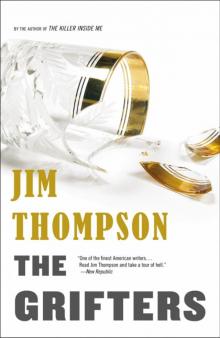 The Grifters
The Grifters The Transgressors
The Transgressors Texas by the Tail
Texas by the Tail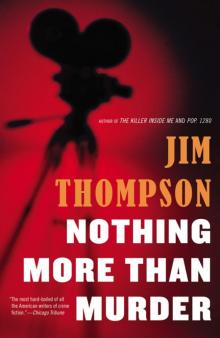 Nothing More Than Murder
Nothing More Than Murder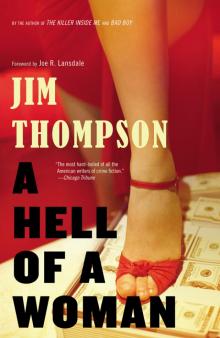 A Hell of a Woman
A Hell of a Woman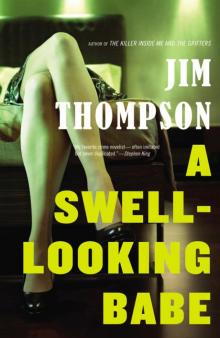 A Swell-Looking Babe
A Swell-Looking Babe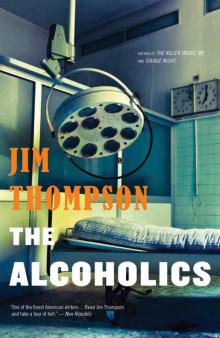 The Alcoholics
The Alcoholics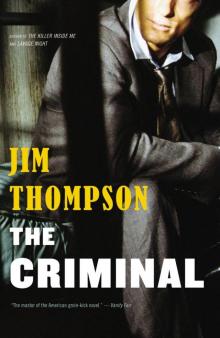 The Criminal
The Criminal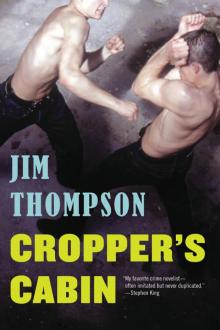 Cropper's Cabin
Cropper's Cabin South of Heaven
South of Heaven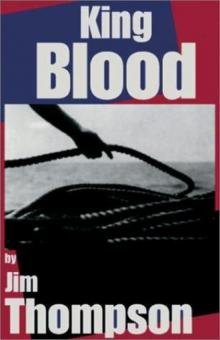 King Blood
King Blood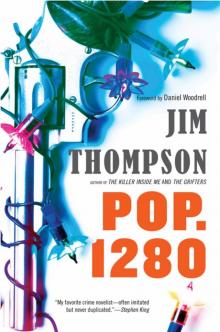 Pop. 1280
Pop. 1280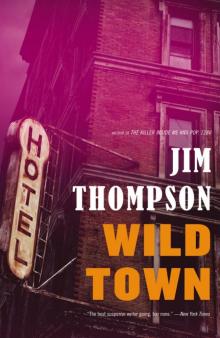 Wild Town
Wild Town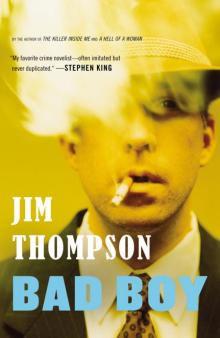 Bad Boy
Bad Boy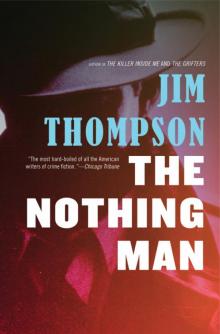 The Nothing Man
The Nothing Man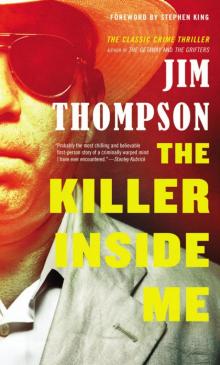 The Killer Inside Me
The Killer Inside Me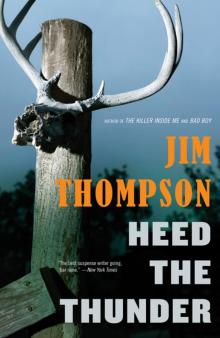 Heed the Thunder
Heed the Thunder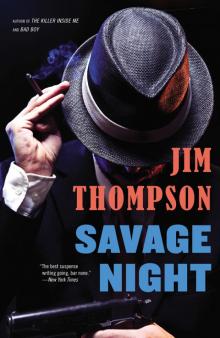 Savage Night
Savage Night Recoil
Recoil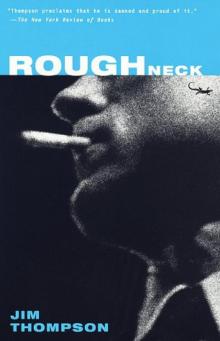 Roughneck
Roughneck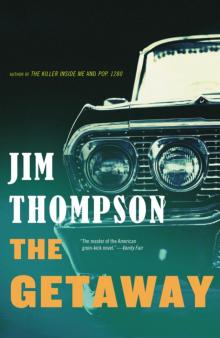 The Getaway
The Getaway